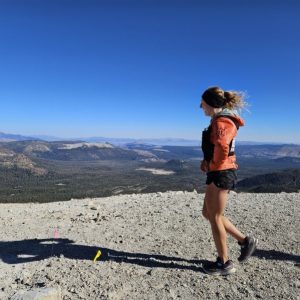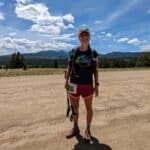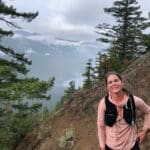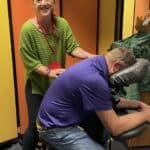Main Menu

About Me
I fell in love with running when I was 15. I grew up doing martial arts alongside my brother and dad, and when that chapter of our lives came to a close and it was time to move on, I fell in love with running. My dad is a runner as well – the trails in the regional park behind the house where I grew up became our sacred place to spend time together. We spent many hours and covered many miles talking about anything and everything; running with my dad was a safe space, a judgment-free zone. I started feeling some pain in my knee, that was eventually diagnosed as early onset arthritis. When I was 23, every step was debilitating, and I was told I would never run again.
I underwent an invasive surgery called a tibial tubercle osteotomy to rearrange my bone and hopefully ease the pain. One surgery, nine months of rehab, was the plan. However, due to a previously unknown allergy, I developed infection after infection, and soon enough, one surgery turned to four and nine months of rehab turned into three years of recovery. In those three years, I graduated with my Master’s degree in Exercise Science, worked as a Certified Athletic Trainer for the New York Mets and the Boston Red Sox, moved across the country five times, visited over 20 states I had never been to, and was told, again and again, that I would never be able to run again.
I love running. I love the connection my dad and I had when we ran together when I was younger. I love the freedom the trails represent. I love feeling my body move, and thanking it for allowing me to do so. I put literal blood, sweat, and tears into my recovery, and I was deadset on finishing a trail race. I signed up for my first half marathon knowing very well it might also be my last. I crossed the finish line holding my best friend’s hand and ran straight into my parents’ arms, crying, because my leg felt healthy. Nothing was wrong. And a completely new world of possibility had opened.
Within five months of my first half marathon, I ran a 10 mile race, another half marathon, a 26k summiting Mammoth Mountain, and a 55k, my first ultra. Ultrarunning is simple and complex, welcoming and daunting, miserable and incredible, painful and beautiful, and my favorite community I have ever been a part of. My background in sports medicine, personal injury history, and unadulterated love for running, even after having it taken away from me for so long, are all parts of what make me a good coach. I want to use my knowledge of the body and how it works and moves and my experience struggling with injury and mental health and apply it to being an ultrarunning coach. Ultrarunning is both an art and a science, and I connect those two aspects of it to successfully coach my athletes to achieve their goals.
There are thousands to tell you it cannot be done, There are thousands to prophesy failure, There are thousands to point out to you one by one, The dangers that wait to assail you. But just buckle in with a bit of a grin, Just take off your coat and go to it; Just start in to sing as you tackle the thing That “cannot be done,” and you’ll do it.
~ Edgar Albert Guest
About My Business
The most important thing for a coach to be is adaptable. I understand that every athlete and every human is different. With my experience in sports medicine, even if two athletes have the same diagnosis, their rehab programs are not the same; bodies all respond differently to different types of stress, and we are all impacted by what is going on in our personal lives. I program accordingly, taking into consideration your life outside of training: work, family, children, responsibilities, whatever it may be. It is entirely possible to be an ultrarunner and continue to put energy into other aspects of one’s life, and as a coach, I help guide my athletes through it. People also respond differently to certain types of motivation. I adapt to each athlete’s communication style and preferred type of motivation to provide the best coaching experience possible.







